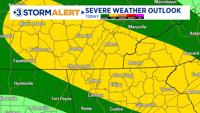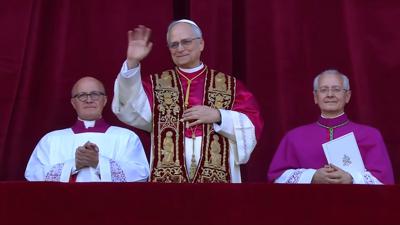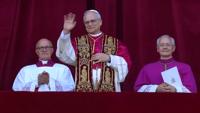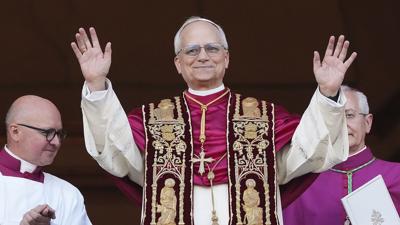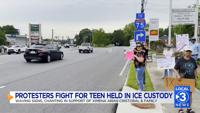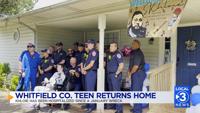UPDATE: Cardinal Robert Francis Prevost of the United States has been elected the 267th pope and has stepped onto the balcony of St. Peter’s Basilica as the new leader of the world’s 1.4 billion Catholics.
He’ll be known as Pope Leo XIV.
Prevost, 69, from Chicago, Illinois, is the first ever pope from the United States.
Cardinals took two days to select a new pontiff, matching the timeline from the previous two gatherings and suggesting that Prevost quickly impressed his peers during the secretive process.
Francis and Benedict XVI were both revealed in the evening of the conclave’s second day, while John Paul II, the longest-reigning pope of modern times, was selected on the third day in 1978.
‘An exceptional leader’
A leader with global experience, he spent much of his career as a missionary in South America and most recently led a powerful Vatican office for bishop appointments. He is expected to build on Pope Francis’ reforms.
He worked for a decade in Trujillo, Peru, and was later appointed bishop of Chiclayo, another Peruvian city, where he served from 2014 to 2023.
Prevost is a member of the Augustinian religious order – which he also led for more than a decade as their prior general, which has given him leadership experience of leading an order spread across the world.
Considered a highly capable and accomplished leader, Prevost most recently led the powerful Vatican office for new bishop appointments, the Dicastery for Bishops, assessing candidates and making recommendations to the late pope. He also served as the president of the Pontifical Commission for Latin America.
While it is often said cardinal electors would always shy away from choosing a pope from the US, due to America’s outsized global political influence, Prevost’s long experience in Peru may have mitigated those fears among the electors.
“He’s somebody that, even though he’s from the West, would be very attentive to the needs of a global church,” said Elise Allen, CNN’s Vatican analyst. “You’re talking about somebody who spent over half of his ecclesial career abroad as a missionary in Peru.”
Allen added that he is seen as an apt leader in Vatican circles because “he’s able to accomplish things without necessarily being authoritarian about the way he did things.”
“Prevost is somebody who is seen as an exceptional leader. From very young, he was appointed to leadership roles,” Allen said. “He’s seen as somebody who is calm and balanced, who is even-handed, and who is very clear on what he thinks needs to be done… but he’s not overly forceful in trying to make that happen.”
Prevost earned his bachelor’s in mathematics from Villanova University in Pennsylvania and went on receive his diploma in theology from the Catholic Theological Union of Chicago.
He was later sent to Rome to study canon law at the Pontifical Saint Thomas Aquinas University and was ordained as a priest in June 1982. Later in his career, he taught canon law in the seminary in Trujillo, Peru.
In an interview with Vatican News shortly after he became the leader of the Dicastery for Bishops, Prevost said: “I still consider myself a missionary. My vocation, like that of every Christian, is to be a missionary, to proclaim the Gospel wherever one is.”
Asked about the contributions of three women who were made members of the Dicastery for Bishops, Prevost told Vatican News: “I think their appointment is more than just a gesture on the part of the Pope to say that there are now women here, too. There is a real, genuine, and meaningful participation that they offer at our meetings when we discuss the dossiers of candidates.”
He also addressed the responsibility of combating clerical abuse, saying: “There are places where good work has already been done for years and the rules are being put into practice. At the same time, I believe that there is still much to learn.”
This is a breaking story. More details soon.
The-CNN-Wire™ & © 2025 Cable News Network, Inc., a Warner Bros. Discovery Company. All rights reserved.
PREVIOUS STORY: White smoke has risen above the Sistine Chapel, the signal that cardinals have chosen a new pope on the second day of the conclave.
His identity, and the name he will take as pontiff, will be revealed soon.
Cardinals took two days to select a new pontiff, matching the timeline from the previous two gatherings and suggesting that a leading candidate quickly impressed his peers during the secretive process.
Francis and Benedict XVI were both revealed in the evening of the conclave’s second day, while John Paul II, the longest-reigning pope of modern times, was selected on the third day in 1978.
The 133 cardinals whose voices reverberated inside the halls of the Sistine Chapel included progressives, conservatives, and self-styled unifiers from 71 different nations, and the chosen candidate will have navigated those contrasting camps to reach the balcony of St. Peter’s Basilica, where he will soon greet his faithful for the first time.
Crowds are eagerly waiting below in St. Peter’s Square, desperate for a glimpse of the man whose identity is moments from being revealed. The French Cardinal Protodeacon Dominique Mamberti will in the coming moments deliver, in Latin, the historic “Habemus Papam!” (“We have a pope!)” announcement.
The winner’s papal name will then be announced, and the new pope will speak briefly and say a prayer. His formal coronation will take place in the days after his election; the last two popes have been inaugurated in St. Peter’s Square.
Days of celebration ahead
The coming days are for celebration; the pontiff’s name will be uttered in homilies and masses across the Catholic world, and will spark particularly joyous scenes in his home country. Adding to festivities, and to the new pope’s diary commitments, is the fact that 2025 is a jubilee year for the church – a special celebration announced by Pope John Paul II 25 years ago, which sees a busy schedule of Vatican-organized events.
But leading the largest Christian denomination through an unpredictable era will require difficult and consequential decisions. The new pope inherits a church whose image and ambitions were transformed by its predecessor; Francis pulled the priorities of the church away from social issues such as abortion, homosexuality, gender roles and contraception, advocating instead for the world’s poor, displaced and needy, and instilling a mission anchored in altruism.
Whether or not to continue that trajectory will be a defining choice for the new pontiff. Francis’ rejection of opulence and his softer tone on social issues was praised by some Western leaders, but there remains a faction in the church advocating for a stricter line on questions of sex, gender, marriage and migration.
He must also choose carefully when to intervene on the world stage. Francis became increasingly political in the final years of his papacy, making the case for the rights of migrants, urging a ceasefire in the Israel-Hamas war, and suggesting – to the ire of Kyiv – that Ukraine should wave “the white flag” and make concessions to end Russia’s war in the country.
These ongoing conflicts, and the rise of populism and authoritarianism around the world, set a complicated context in which the new pope – himself an important figure in global diplomacy – will operate.
And he must deal with crises from within, too. Francis’ failure to bring a close to the years-long scandal of child sexual abuse in the church will also reverberate through his successor’s papacy. Though he spoke defensively about his record on the matter, and took some important steps to tackle systemic issues involving abuse, the previous pope was accused by survivors’ groups of failing to hold accountable bishops and cardinals accused of covering up abuse.
Last year, Francis’ commission for child protection said in its first report that parts of the church are still failing to ensure that abuse is properly reported, and raised concerns about a “lack of transparency” in how the Vatican handled cases.
This is a breaking story. More details soon.
The-CNN-Wire™ & © 2025 Cable News Network, Inc., a Warner Bros. Discovery Company. All rights reserved.
PREVIOUS STORY: VATICAN CITY (AP) — Catholic cardinals will sequester themselves Wednesday behind the Vatican’s medieval walls for the start of a conclave to elect the 267th pontiff of the Roman Catholic Church, a successor to Pope Francis who died in April at the age of 88.
The 133 cardinals from 70 countries will be locked inside the Sistine Chapel, where they will vote in secret and silence, a process designed to be both contemplative and free from outside interference. They will surrender their cellphones and airwaves around the Vatican will be jammed to prevent them from all communications until they find a new leader for the 1.4 billion-member church.
Here is the latest:
A cardinal by any other name
As the cardinals prepare for the start of the conclave, many wonder if the next pontiff's name will be Petrus, Robertus or Ioannes? Maybe Claudius or Christophorus? Or perhaps Timoteus?
The crowds should be prepared to hear it first not in a cardinal's native Italian, French, Spanish or other tongue, but in Latin.
The new pope will be announced with the Latin proclamation: “Annuntio vobis gaudium magnum: Habemus Papam!” (“I bring you tidings of great joy: We have a pope!”)
That will be immediately followed by the revelation of his birth name, in Latin, followed by the papal name he has chosen, also in Latin.
If the first word uttered is Petrus, that could refer to several cardinals whose names are some version of Peter, including Pietro Parolin, Peter Turkson and Péter Erdő. Also, several of the cardinals' names include some version of Ioannes, or John.
Mass ahead of the start of the conclave is over
A morning Mass in St. Peter’s Basilica has concluded, allowing the cardinals who will elect the next pope to return to their residences for a few hours ahead of the conclave.
Later in the afternoon, the Vatican has said that all communications around the Holy See will be jammed as they prepare to withdraw from the outside world for their secret and sacred task ahead.
The cardinals are likely to cast their first vote later on Wednesday. Assuming no one is elected, black smoke would be expected out of the Sistine Chapel chimney at around 7 p.m.
The cardinals will then retire for the night and return on Thursday morning. They can hold up to two ballots in the morning and two in the afternoon until a winner is found.
While cardinals this week said they expected a short conclave, it will likely take at least a few rounds of voting.
A prayer for a young pope
Lisette Herrera, a 54-year-old tourist from the Dominican Republic, was deeply moved to find herself by chance in the heart of Roman Catholicism as the church plans to select a new pope.
On Wednesday morning, she decided to skip seeing the Spanish Steps and the Trevi Fountain and other sites to pray in St. Peter’s Square and wait for a new pope, even though she realizes there is no telling how long the conclave could take.
“I’m praying the Holy Spirit for a young pope who would stay with us for a long time,” she said. “I don’t believe in conclave politics, I just feel that the Holy Spirit is here and that’s all we need to know.”
Rome on high alert ahead of the conclave
The Vatican’s Swiss Guards and Italian carabinieri and police have been mobilized as Rome and the wider world hold their breath to see who will emerge from the conclave as the next pontiff.
As of Wednesday morning, when cardinals attended a special pre-conclave Mass in St. Peter’s Basilica, police were carrying out enhanced checks of people entering St. Peter’s Square.
Over 4,000 officers have been deployed, with an anti-drone system and signal jammers to block communication between the cardinals and the outside world once they enter into their secret assembly.
“The safety of the cardinals is a priority, but so is that of the faithful outside,” said Fabio Ciciliano, head Italy’s Civil Protection agency.
A please to choose a pope who prizes unity in diversity
A senior cardinal has urged the cardinals who will vote in the conclave to elect a pope who prizes unity in diversity, and puts personal interests aside.
Cardinal Giovanni Battista Re, the dean of the College of Cardinals, outlined the marching orders for the 133 men who will enter the Sistine Chapel later on Wednesday to begin voting to elect a new pope.
In his sermon at the final pre-conclave Mass at St. Peter's Basilica, Re reminded the cardinals that a conclave represented the highest human and church responsibility, and that they must set aside “every personal consideration.”
He said the new pope should foster communion and unity within the church.
A final pre-conclave Mass
Cardinals have entered St. Peter’s Basilica on Wednesday to celebrate the final Mass before the conclave to elect a new pope.
The dean of the College of Cardinals, Giovanni Battista Re, is celebrating the Mass and leading the prayers for cardinals to find the wisdom, counsel and understanding to choose a worthy new shepherd.
Re, 91, had presided at Francis’ funeral two weeks ago, delivering a heartfelt sermon recalling history’s first Latin American pope and the reforming 12-year papacy he oversaw.
Later in the day, the cardinals will sequester themselves in the Sistine Chapel to begin casting their ballots.
How the voting works
The electors cast paper ballots, and voting continues until one candidate receives a two-thirds majority, or 89 votes. After two rounds of voting, ballots are burned in a special stove — black smoke signals no decision, while white smoke means a new pope has been chosen.
The last few popes have been elected within a few days, but there is no formal deadline. Electors must be under 80, and are more geographically diverse than ever.
They represent Catholicism’s growing presence in Africa, Asia and Latin America, as well as its traditional power base in Europe.
Prayers in the Philippines for another pope good for poor people
Nearly 100 people in a slum in Manila, the Philippine capital, were praying Wednesday for the conclave to elect another pope who will reach out to the poor.
Rev. Robert Reyes told the crowd in a small chapel surrounded by shanties in suburban Quezon city that the next pope should be humble and inclusive, like Francis.
“Francis was such a unique person open to all, specially to those who are neglected, forgotten, marginalized, rejected and oppressed,” said Reyes.
The Philippines, the largest Roman Catholic nation in Asia, has long been plagued by poverty and inequality.
Copyright 2025 The Associated Press. All rights reserved. This material may not be published, broadcast, rewritten or redistributed without permission.


